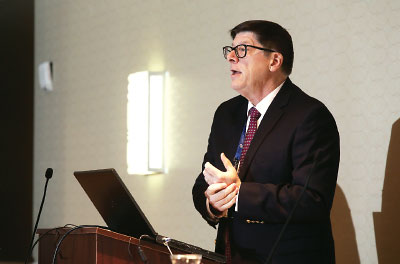CMS Approves Payment for Coordinated Specialty Care of First-Episode Psychosis
Abstract
The new reimbursement codes, which are the result of advocacy by a subgroup of the Psychosis Risk and Early Psychosis Program Network, will expand access to the evidence-based treatment.
The Centers for Medicare and Medicaid (CMS) has established new billing codes for payment of the array of services included in Coordinated Specialty Care for First-Episode Psychosis (CSC-FEP).
The codes will make it easier for private and public insurance programs to pay for these services and for community-based mental health programs to offer CSC-FEP to people who need it.
CSC-FEP had its origins in the landmark National Institute of Mental Health (NIMH) study Recovery After an Initial Schizophrenia Episode (RAISE), which demonstrated the success of team-based care and shared decision-making offering psychotherapy, medication management, family education and support, case management, and work or education support. According to the 2021-2022 State Snapshot of Early Psychosis Programing Across the United States from the Early Psychosis Intervention Network (EPINET), the number of CSC-FEP programs has grown from 59 in 2014 to 353 in 2021.
The new codes are the result of advocacy by a subgroup of the Psychosis Risk and Early Psychosis Program Network (PEPPNET), which is focused on financing the array of services that are needed to make CSC-FEP successful. APA is one of the participating members in PEPPNET.
“CMS recognition of CSC-FEP as an effective team-based approach for serving persons with first-episode psychosis is a game changer,” David Shern, Ph.D., a co-chair of the PEPPNET subgroup on financing, told Psychiatric News.
Shern explained that existing Medicaid and fee-for-service commercial insurance codes did not cover the full range of services. “The lack of an identified reimbursement code for these team-based services was an impediment,” Shern said. “States and community-based programs were forced to come up with ad hoc coding conventions to cover all of the CSC services. Having recognition by the major payor in the American health care system of CSC as an evidenced-based model for care of early psychosis is a big deal.”

“The new reimbursement codes will increase access to a valuable, potentially lifesaving service, said Lisa Dixon, M.D.
He added, “What is exciting about this is that as a system we are moving ‘upstream’ to get care to people more quickly than we have traditionally.”
The codes authorized by CMS are Level II Healthcare Common Procedure Coding System (HCPCS) codes. According to CMS, Level II HCPCS codes are used primarily to identify products, supplies, and services not captured by Current Procedural Terminology (CPT) codes (the numerical coding system maintained by the AMA). Level II HCPCS codes are used for billing such forms of health care as “ambulance services and durable medical equipment, prosthetics, orthotics, and supplies when used outside a physician’s office.”
Shern likened coordinated specialty care to Assertive Community Treatment, which involves multiple components of care as well as involvement of community members and institutions. “This is a community-based service with outreach to people in the family and to other components of the community,” he said. “In order for it to be successful, the full cost of it needs to be covered.”
Lisa Dixon, M.D., director of OnTrackNY, one of the first and most well-developed early psychosis treatment programs, agreed. “This is going to increase access to a valuable, potentially lifesaving service,” she said. “There are states that have led the way and really invested their dollars in this model of care. But in order to really make this stick, we need a way to pay for it that cuts across the different states.”
She is also editor of the APA journal Psychiatric Services.
Dixon said the codes may help improve and standardize CSC-FEP. “We have a very complex and inconsistent health care system, but we have a reasonable description of what [coordinated specialty care] entails, and theoretically now we can look at these programs and evaluate the nature of the services provided. This is a really important first step in expanding access and, I hope, to improving care.”

“With these codes, CMS is saying it understands that coordinated specialty care is a multi-element service, and all of the elements are important,” said Robert Heinssen, Ph.D.
Robert Heinssen, Ph.D., senior adviser for learning health care research and practice at NIMH and the NIMH scientific officer for the RAISE study, agreed. He said that health services researchers can now evaluate the impact of the codes: Do they increase access to care? Do they improve quality, effectiveness, and sustainability of care?
“NIMH is thrilled with this development and is eager to work with researchers interested in exploring these issues,” he said.
Heinssen noted that in 2015, when CSC-FEP was first being promoted as an evidence-based treatment, NIMH, CMS, and the Substance Abuse and Mental Health Services Administration developed guidance for states and community-based programs on how to finance CSC-FEP services—using Medicaid waivers and money from state mental health block grants. That guidance helped fuel the growth of the programs.
But it remained a tricky task to cobble together dollars for all services provided by CSC-FEP. “Analyses of current programs suggest that only about 50% of the direct costs of furnishing these services are covered by conventional fee-for-service insurance,” Heinssen said. “It required a lot of ingenuity on the part of states to ‘braid’ multiple federal, state, and private funding mechanisms to cover the full costs of CSC. The solutions were often idiosyncratic and year to year because they rely on monies appropriated on an annual basis, which impedes long-range planning.
“With these codes, CMS is saying it understands that coordinated specialty care is an integrated, multi-element service, and all of the elements are important.” He noted as well that one development in CSC-FEP since the RAISE study has been the incorporation of people with lived experience of mental illness as peer support specialists. “These services will be covered by these omnibus billing codes,” Heinssen said. ■



